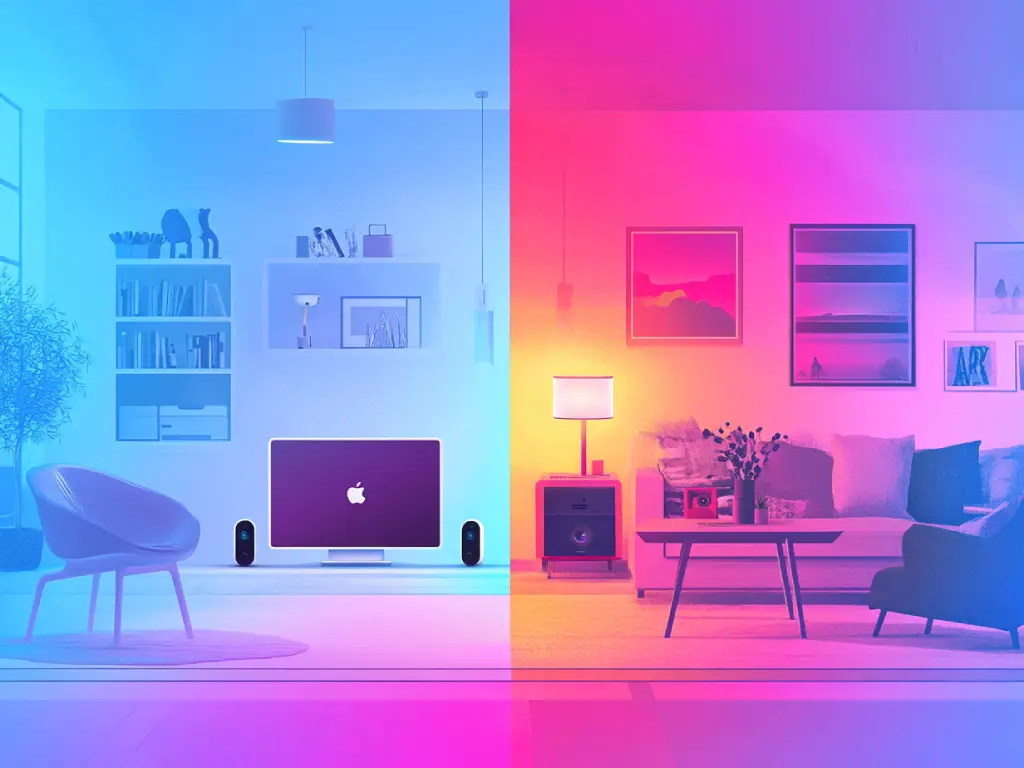1. The ecosystem: a different philosophy
HomeKit: simplicity and security
Apple designed HomeKit around two main pillars: seamless integration and security.
All compatible accessories must pass strict certification to ensure high standards in data protection.
With devices like the Apple TV and HomePod serving as home hubs, HomeKit focuses on delivering a consistent and integrated user experience.
Advantages of HomeKit:
- Native integration with Apple devices.
- HomeKit Secure Video, for securely storing video on iCloud.
- Strict privacy standards.
Alexa: versatility and compatibility
Alexa stands out with a very open ecosystem.
With thousands of compatible devices and straightforward integration, Amazon has captured a wide user base.
Alexa also excels in voice commands and complex routines.
Advantages of Alexa:
- Extensive compatibility with third-party devices, often at lower costs.
- Alexa Skills to customize functionality.
- Greater variety of smart speakers.
2. Voice commands
Siri: a minimalist approach
Siri, integrated into the HomeKit ecosystem, is designed to work seamlessly with Apple products. However, its vocabulary can be limited, and it lacks Alexa's flexibility.
For example, Siri excels at basic commands like "Turn on the lights in the living room", but it may struggle with more complex commands or non-Apple integrations.
Alexa: The King of Versatility
Alexa shines with its ability to understand and execute complex commands, even in multi-device environments.
With more conversational responses, Alexa is also more intuitive for the average user.
For instance, Alexa can handle sophisticated routines like: "If the temperature drops below 18°C, turn on the heating and send me an alert."
3. Device compatibility
HomeKit: a limited but robust choice
HomeKit’s catalog is expanding every year but remains less extensive than Alexa's. Nevertheless, every device is rigorously tested to ensure a reliable experience.
- Key brands: Eve, Philips Hue, Logitech, Netatmo.
- Hub required? Yes, an Apple device like an Apple TV or a HomePod is necessary.
Alexa: near-universal compatibility
Alexa supports an impressive number of brands and products, from simple smart plugs to advanced security systems. Its openness is its greatest strength.
- Key brands: Ring, TP-Link, Arlo, Ecobee.
- Hub required? No, Amazon Echo speakers are often sufficient.
4. Automation and scenarios
HomeKit: simplicity first
HomeKit allows the creation of scenes and automations based on straightforward conditions, like time or location. However, its options are more limited than those offered by Alexa.
Example of a HomeKit scenario: "When I leave home, turn off all lights and lock the doors".
Alexa: broader possibilities
Thanks to its integration with skills and IFTTT (If This Then That) connectivity, Alexa offers far more complex scenarios suited to advanced configurations.
Example of an Alexa scenario: "If motion is detected in the garden at night, turn on the outdoor light and send a notification."
5. Security and privacy
Siri: impeccable security
With HomeKit, Apple emphasizes strict data protection.
Siri commands are often processed locally, minimizing risks of leaks or hacking.
Additionally, videos from cameras compatible with HomeKit Secure Video are encrypted end-to-end and stored in iCloud, ensuring confidentiality.
Siri's Security Strengths:
- No commercial use of voice data.
- Data processed locally (when possible).
- Strict certification for compatible accessories.
Alexa: a questionable track record
While technically robust, Alexa’s more open model makes it vulnerable to certain privacy risks.
User voice data is processed in the cloud and may be used for commercial purposes, raising concerns among some users.
Alexa's Privacy Limitations:
- Voice data is stored in the cloud.
- Potential commercial use of collected information.
- Frequent criticism regarding privacy practices.
6. Pricing
Siri: a premium choice
Apple’s ecosystem is often associated with a high-end positioning, and this is reflected in pricing.
HomeKit accessories, along with Apple products like the HomePod or Apple TV serving as hubs, represent a significant investment, which may deter users seeking an economical solution.
Typical Costs:
- HomePod Mini: ~€99.
- Apple TV (HomeKit hub): ~€179.
- Compatible accessories: often more expensive due to certifications.
Alexa: the affordable option
Amazon has democratized smart homes with affordable products like the Echo Dot, available for less than €50.
Additionally, the wide range of compatible accessories includes low-cost solutions, making Alexa an accessible choice for budget-conscious users.
Example Prices:
- Echo Dot: ~€30 on promotion.
- Compatibility with low-cost brands like TP-Link.
- No need for a central hub in many cases.

